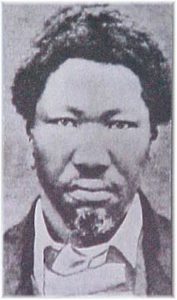
Adam Kok III
*Adam Kok III was born on this date in 1811. He was a Black leader of the Griqua people in South Africa.
The son of Adam Kok II, Kok III was born in Griqualand, West South Africa. His family and father's followers moved to the area after disputes with other groups, and he was educated at the Philippolis Mission School. At a young age, he was appointed a member of the Griqua Council and would act as chief while his father was away.
He succeeded his father as the ruler and leader of the Griqua in Philippolis after his father died in 1835. His older brother, Abraham, could have taken over as chief. Still, Kok III's political experience impressed the Griqua elders, and he was deemed the preferred choice to replace his father. Interaction with other groups The Napier Treaty signed in 1843 between Moshoeshoe I and Adam Kok III - advised and assisted by the missionaries recognized Moshoeshoe's jurisdiction over his land between the Orange and Caledon rivers. Napier hoped this treaty would keep peace in the area so the British could carry on undisturbed trading. The Wesleyan missionaries and chiefs immediately opposed the treaty because it took away some of their lands.
Kok III would lease some land to the Trekboere, and by 1836, more than 1,500 farmers had already settled in Griqua territory. He then passed a law in 1838 that forbade the sale of leased land to the Trekboere. In 1840, this was modified on the condition that the Trekboer would have to recognize Kok III's jurisdiction and authority over the land from the Griquas. Although they were not allowed to sell, the Griquas allowed long leases with Europeans, sometimes longer than 40 years. In 1861, Kok III accepted a British offer to settle his people in the eastern section of the Cape Colony. He then led them on a two-year trek across South Africa.
During the trek, the Griqua lost most of their cattle and horses as they suffered through droughts and raids by the Basotho. In February 1863, they crossed the Drakensberg at Ongeluks Nek and descended along the banks of the Kenigha River onto Mount Currie, where they founded Griqualand East. After settling down, they worked on replenishing their herds and flocks. They also built structures using bricks and succeeded in setting up an efficient method of government and legislature. They raised their revenue through tax, trading licenses, and fines. In 1867, they printed their currency, which was only used in their jurisdiction. These coins and notes never reached full circulation, and payments for levies were usually made in cattle, goats, sheep, and grain.
In 1874, Kok III assisted the British in a campaign against the Hlubi in Natal. That same year, the Cape Colony placed Griqualand East under custodial government, effectively deposing Kok III. Death Kok III died without an heir on December 30, 1875, after being injured in a wagon accident. The Cape Colony formerly annexed Griqualand East in 1877 after passing the Griqualand East Annexation Act (Act 38 of 1877). The Act was only promulgated on September 17, 1879, when four magistrates were set up at Kokstad, Matatiele, Mount Frere, and Umzimkhulu.